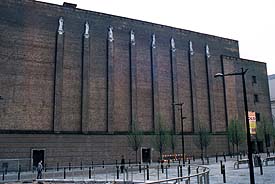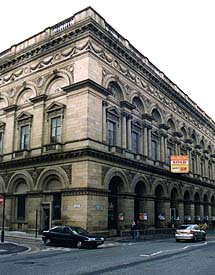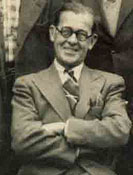|
Page Nine
Teaching staff changes were frequent, but not excessive-indeed the rate was probably below the city average. In July 1968, two stalwarts retired, Miss H. Lord and Mr. L. Holding. Mr. Holding had taught many subjects since joining the staff in 1932 (36 years service). In Central School days especially, he was a leading figure on the Old Scholars'Committee and he organised school stock during Technical High School days. His concern for neatness and clear decipherable writing was well known and one of his colleagues describeo him as the "protagonist of the difficult and unpopular child". By her retirement, Miss Lord broke an association with the school which had been almost continuous, except for training. Beginning in 1916 she had been scholar, pupil teacher, head girl, teacher and Senior Mistress, as well as being teacher member on the Old Scholars'Committee since 1941. "Torch" paid a fitting tribute-"Her unfailing dignity and humility earned her the respect and affection of everyone. She was always busy, but always admirably self-possessed, her firmness tempered with sympathy and humour". Happily she continued to serve on the Old Scholars' Committee after retirement. In July 1961, Miss C. Darbyshire kindly and respected, retired, as did Mr. G.E. Dunckley, possessed of similar virtues, although he only exchanged full time for a part time engagement until he left finally in July 1972. Two other colleagues who worked effectively and patiently with slow learning groups, Mr. H. Gooch and Mr. T. Sowerby, retired in 1970 and 1973 respectively. In July 1970, Mr. Hughes retired, having been on the staff since 1949. His contribution, first as Head of Mathematics and then Head of Science played a great part in the building up of the 6th form and in establishing sound traditions in science teaching. In July 1972, Mr. Roberts retired. At the customary staff retirement tea, many of his former Nicholls colleagues were present, and on the last afternoon of the School year he took the final Junior School assembly from the platform of the new Nicholls Hall. He had presented the prizes and spoken as Chief Guest at the Junior School Speech Day some days earlier, when in turn he received a special presentation from Susan Keeley of 3A on behalf of the school. On this occasion, the Headmaster paid tribute to Mr. Roberts for his outstanding contribution to education within the city after nigh on 40 years service, both as an outstanding teacher and leader and a friendly and sympathetic colleague. Mr. Howard had succeeded Mr. Martin as Head of Senior School, and now he took over Mr. Robert's responsibilities as Deputy Headmaster and Head of Junior School. In May 1973, following a Committee decision to have two Deputy Heads in the larger schools, Mr. .I. H. Jones took up an appointment as Second Deputy Head and Head of the Senior School. By this time, it had become the practice to refer to the two sides as Upper and Lower Schools. When Miss Darbyshire retired, Mrs Parker (formerly Miss Wood) had replaced her as Deputy 2nd year tutor. Mrs E. C. Jones and Miss Mellor changed responsibilities as 3rd and 4th year Deputy Tutors, Mr. V. C. Sayer became Deputy 1st Year Tutor and Mr. B. Race became 5th year Tutor. When the school opened, the services of Mrs L. Noble (English), who had been on the Technical High School Staff, were retained until the end of September, when she retired and Mr. Bowyer (of Ardwick Secondary Girls School) helped for two weeks prior to secondment for a year's course.   It was inevitable that the role of Speech Day in the life of a large school would come under review. The use of the Free Trade Hall, admirable as that building was in terms of accommodation, caused many organisational problems. The Headmaster felt, however, that it would be useful for the school, in its infancy, to have an initial ceremony there, with all the 3rd, 4th, 5th and 6th forms and parents present. This first ceremony was held on Monday, 25th March 1968, at 7.15 p.m. following a rehearsal in the morning. The Chairman of the Education Committee, Councillor Kathleen Ollerenshaw took the chair, and Alderman Leslie Lever appropriately was Chief Guest and presented the prizes and certificates. Votes of thanks were proposed by the two senior prefects, John Simpson and Christine Poynton. There was no prefect system in the school, but all 6th formers performed certain school duties on a rota basis. There was music by choirs and a recorder group. On this occasion, the Headmaster, in his report, clearly stated the aims "We are striving to build up a happy school, where courtesy and good manners are characteristic, where loyalty to school, home and community are virtues, where effort and interest are stimulated, and where all ranges of ability are sympathetically catered for". In April 1969, the ceremony became more intimate and domestic by being held in "N" Hall, admirable in many ways, but it placed a restriction on numbers, with only the 4th, 5th and 6th forms and parents being present. Councillor J. K. Barber (Deputy Chairman of the Education Committee) was in the chair, and Dr. K. Laybourn (Deputy Chief Education Officer) was Chief Guest and Robert Brownrigg and Patricia Ryan proposed the Vote of thanks. In April 1970, with the same chairman, Dr. A.M. Smith, Director of Manchester Polytechnic, was Chief Guest and David Pridgeon and Helen Jones performed the duties of Senior Students. in April 1971, Councillor J. K. Barber, now Chairman of the Education Committee, was Chief Guest, with Mr. R.W. Baldwin, Deputy of the Management Sub-committee, in the chair. Stuart Ashmore and Jean Ogden proposed the vote of thanks and by this time the band was contributing to the programme. In April 1972, Alderman F. Hatton, again Chairman of the Education Committee, was Chief Guest at short notice, and was thanked by David Rigg and Christine Cowley. In April 1973, Alderman Hatton, as Chairman weicomed Mr. Gerald Kaufmann, M.P. for Ardwick as Chief Guest, with Graham Keeley and Judith Wong proposing the vote of thanks. On all these occasions, there was a very representative platform party. These Senior School Speech Days were followed each July by one for the Junior School (Years 1 and 2 and occasionally Year 3). This took the form of an Open Evening, with various displays and demonstrations which followed a short ceremony with music, a report, a short address and presentation of prizes by a Guest, and a vote of thanks by two stholars. On all these occasions, parental support was commendable. The guests were:- '968, and 1970, Mr. R. H. Keast, District Inspector; 1969. Mr. J. Hall, Deputy Chief Education Officer; 1971. Mr. A. Freer, Senior District Inspector and 1972, Mr. H. Roberts. After this date, the Junior School ceremony was discontinued, mainly because the decline in numbers on roll meant that more could attend the main school event. The prizes which had been donated for the Technical High School continued to be available, with the addition of a Mathematics Prize presented by Mrs S. Martin in memory of her husband, a prize for service to the school presented by Miss Lord, and the McKerrow Exhibition, an endowed prize for those proceeding to Teacher Training College. Regrettably, in 1970, Councillor Parkinson died and his prizes given generously for so many years, were no longer available. The Leslie Lever Trophy for the best piece of creative work was won by Madeline Gibbons (Needlework) in 1968 and by Jacqueline Bulmer, Ann Collinge, Frances Brakewell and Denise Irving in successive years, with individual items of Art work. In 1973, Mohammed Choudhary and David Hampton shared the honour, again for Art work. Robert Schofield and Linda Longworth shared the Lord Woolton essay prize in 1968, and for the next three years Christine Blakeley was the winner. In addition to providing a Remembrance Day wreath and prizes at Speech Day, which by tradition went to two Senior Students, the Old Scholars'Association generally held a well supported Dinner Dance in March and a reunion in November. By 1973, school had settled to its comprehensive pattern. The six years had been eventful and, to a good degree, successful. Changes were still taking place and, as the Headmaster said in his report at Speech Day in 1972, "The role of the Headmaster in Schools like this is changing. He has become more of a social engineer, welding together a school community socially as well as educationally. Our Schools reflect the state and attitudes of society. In our profession, we wish that the ideas of the vast majority of us had greater influence. Often we feel ourselves to be striving to maintain standards against a tide of dangerous permissiveness and harmful influences. Parental support is vital to us. Equally, we seek to get the co-operation of all boys and girls as we teach them, lead them, and advise them, in preparation for adult life". There were many challenging and interesting problems to be faced in the next few years. |



